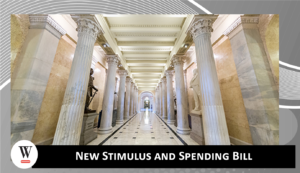Long awaited new stimulus and spending bill finally passed last evening.
……………………………………………………………………
 Dear clients and friends:
Dear clients and friends:
We hope you’re enjoying the abnormal holiday season upon us and staying healthy. Late Sunday night, President Trump signed into law a second significant stimulus package as part of H.R. 133. This $900 billion bill provides Covid-19 related relief to businesses and individuals. The bill is over 5,500 pages in length, we summarized the major tax components below.
Stimulus payments
The bill provides another round of individual stimulus payments – $600 for individuals, $1,200 for married couples, plus $600 for each dependent child under age 17. Taxpayers over the age of 17 and claimed as a dependent on another return are ineligible to receive a payment. Payments phase out once adjusted gross income (AGI) exceeds $75,000 for single filers and $150,000 for married filers. Your 2019 AGI will be used to determine payment amount.
These payments represent an advance against a 2020 tax credit that can be claimed on your 2020 1040. Checks will be sent in the coming weeks; the Treasury will use bank information on file with the IRS for direct deposit.
Unemployment Insurance
Included in the bill is an additional $300 per week for all workers receiving unemployment benefits, through March 14, 2021. PUA also was extended until March 2021 for self-employed and gig workers. The bill increases the maximum number of weeks someone can claim benefits through regular state unemployment or the PUA program to 50 weeks.
Payroll Protection Program (PPP)
This program originated during the CARES Act. This bill includes $284 billion for Round 2. The program will operate like the first round but there are some changes.
Deductibility of expenses paid with PPP funds. Section 276 of the latest bill states that “no deduction shall be denied or reduced, no tax attribute shall be reduced, and no basis increase shall be denied, by reason of the exclusion from gross income. Businesses may take deductions for business expenses paid by PPP loans, including businesses that already filed for forgiveness.
Simplified Forgiveness application for loans under $150,000. These borrowers will only be required to submit a one-page form and only subject to audit if they commit fraud or use the proceeds for improper purposes.
Eligibility for Second Round Loan – 300 or fewer employees (down from 500), have already or will use all proceeds from initial PPP loan, and can establish that they experienced a 25% drop in gross receipts during any quarter in 2020 compared to that same quarter in 2019. As of this writing, guidance on determining gross receipts has not been established. We should have answers from the SBA within the next 10 days.
Loan amounts will be based on 2.5 times the borrower’s average monthly payroll for 2019, limited to $2 million. Food service and accommodation industries are permitted to borrow 3.5 times average monthly payroll, still limited to $2 million.
All borrowers are required to spend 60% of loan proceeds on payroll costs – wages, health insurance, payroll taxes.
New legislation also provides PPP borrowers who have not yet applied for forgiveness the opportunity to spend proceeds on four new non-payroll expenses, in addition to rent, utilities and interest costs. Non-payroll costs cannot exceed 40% of the total costs eligible for forgiveness.
- Operations expenditures – business software, cloud computing, payroll tracking software, sales and billing functions, processing payments.
- Supplier costs
- Property damage costs sustained during public disturbances in 2020.
- Covered worker protection – capital or operating expenditures that were required to comply with requirements issued by Department of Health and Human Services, CDC or OSHA beginning March 1, 2020 and ending when the national emergency declared by the President expires.
Covered Period to spend PPP proceeds is no longer locked into either 8 weeks or 24 weeks, the borrower can choose any period between 8 and 24 weeks.
……………………………………………………………………
Miscellaneous items
100% business meals deduction permitted in 2021 and 2022. You still need to meet requirements such as not lavish, taxpayer is present, as is an employee or business associate and business was discussed.
Charitable contributions deduction, taxpayers who do not itemize their deductions can claim up to a $300 charitable deduction when calculating their adjusted gross income in 2020. This provision extends that deduction to 2021 and increases the deduction to $600 for married filers.
Unreimbursed medical costs are deductible to the extent they exceed 7.5% of AGI. This bill makes that permanent instead of increasing to 10% as was set to happen in 2021. Ex. AGI is $100k, medical expenses paid of $10k, you would receive a medical deduction of $2,500.
Permanent Section 179D costs, this allows a limited deduction for energy efficient improvements made to nonresidential rental.
Additional loan forgiveness under SBA – under CARES Act, the SBA paid six months of a borrower’s principal and interest on existing Section 7 loans. This bill provides an additional three months beginning February 2021 and for taxpayers involved in hospitality and accommodation industry allows for eight months. The amount paid under this program is not taxable.
More details will emerge now that the bill is finalized, and as new information rolls out we will continue to provide information to you. Once the SBA provides further guidance (they have 10 days to do so) on the second PPP we will be conducting webinars to answer questions and go into further details. Look for that invitation via email.
2020 has certainly proved to be a challenging year for everyone but we are grateful for your continued trust and working together to find solutions. We will get through this, stay positive, stay strong and stay healthy. As always if you have questions about this bill or other matters, please contact us.
The team at Werner & Co. CPAs

